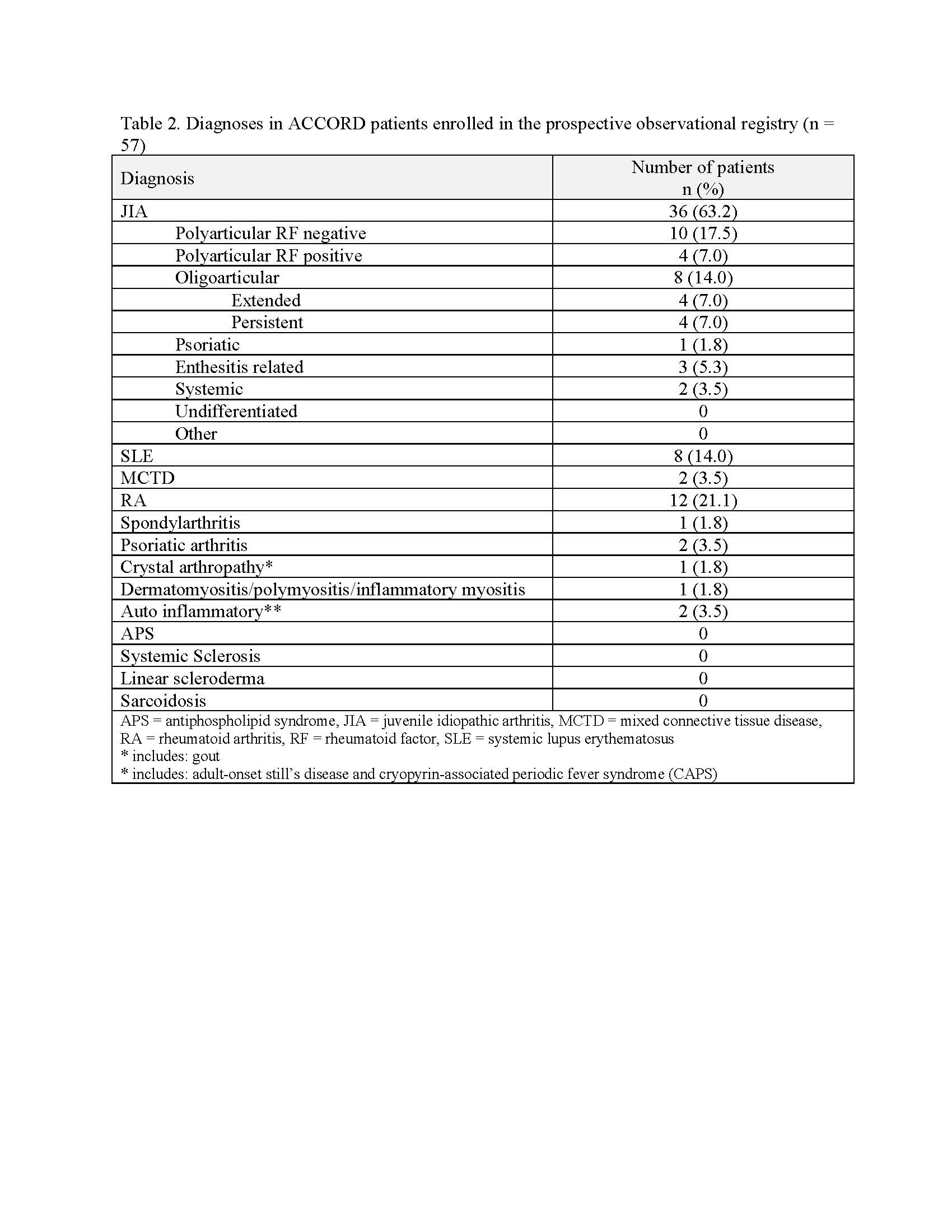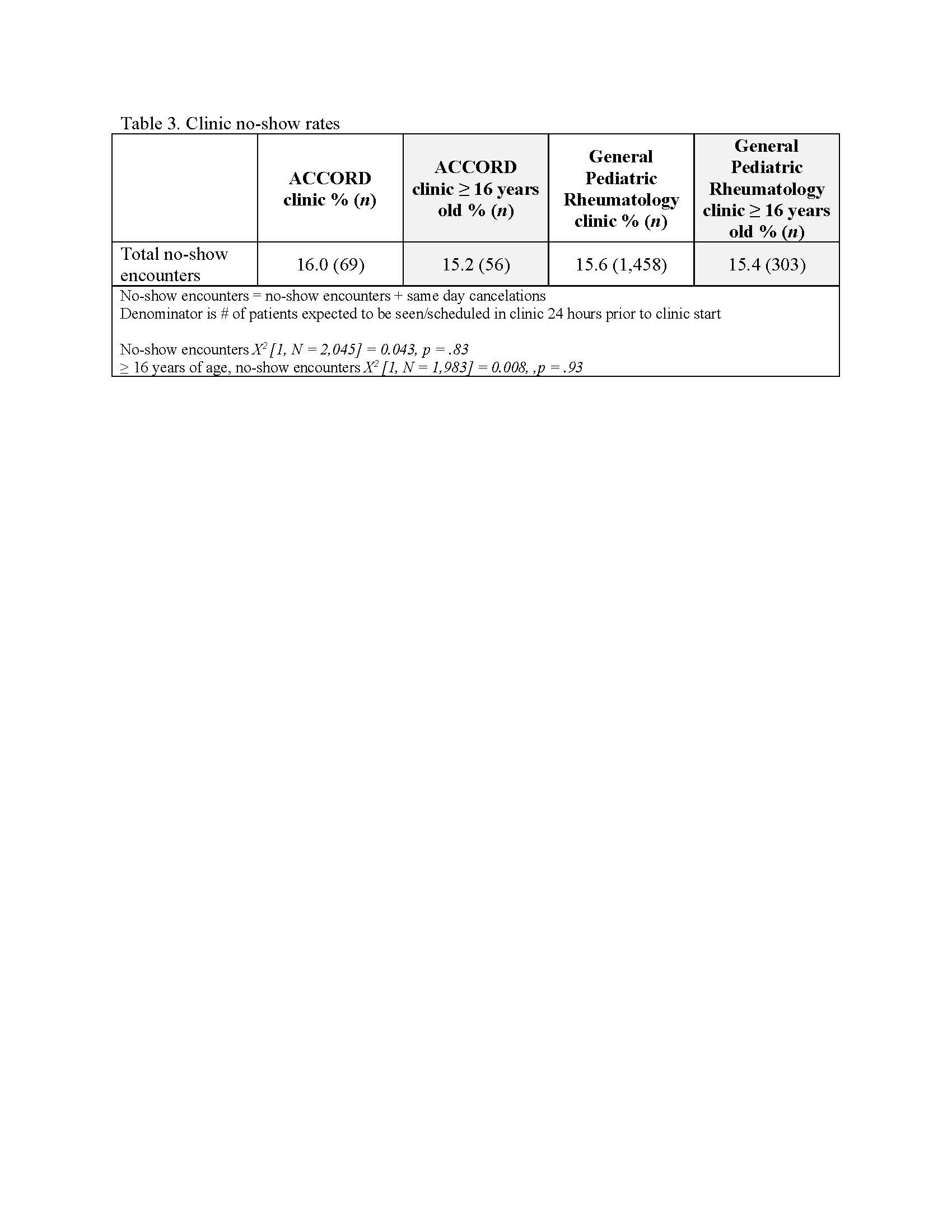Session Information
Date: Sunday, November 7, 2021
Title: Measures & Measurement of Healthcare Quality Poster (0623–0659)
Session Type: Poster Session B
Session Time: 8:30AM-10:30AM
Background/Purpose: The transition of health care from Pediatric to Adult providers for adolescents and young adults with childhood onset rheumatic disease continues to be associated with poor outcomes. In 2018, we initiated a novel transition clinic structure (ACCORD), integrating an Internal Medicine – Pediatrics trained Adult Rheumatologist in a Pediatric Rheumatology clinic to guide this transition. Our goal is to improve transition outcomes in childhood onset rheumatic disease. We report the preliminary outcomes of this intervention.
Methods: In the ACCORD clinic, the Adult Rheumatologist assumed medical management and guided the patient and their family through a transition curriculum. If they consented to do so, patients and their families were enrolled in a prospective observational outcomes research registry. Initial data from this transition clinic is reported. Descriptive statistics are employed.
Results: From November 2018 – December 2020, the ACCORD transition clinic Adult Rheumatologist saw 177 patients and enrolled 57 patients in the registry. From this registry, all patients reviewed the Transition Policy with the Adult Rheumatologist; 45 (78.9%) completed at least one Transition Readiness Assessment; 12 (21.1%) twice completed the Transition Readiness Assessment. 22 (38.6%) transitioned to an Adult Rheumatologist; 17 (29.8%) continued care post-transition with the ACCORD Adult Rheumatologist outside of the transition clinic. The median time between a last ACCORD clinic visit and a first Adult Rheumatology visit was 5.1 months (SD = 5.0, range 1.6 – 8.7). No transitioned patients enrolled in the Registry have failed to schedule with and be seen by an Adult Rheumatologist. There was no statistical significant difference in no-show rates between the ACCORD clinic and the general Pediatric Rheumatology clinic; both for patients of all ages, or for those limited to ≥ 16 years of age.
Conclusion: Our experience demonstrates the feasibility of our clinic model. Our registry shows transition rates of 100.0% and a median transition interval of 5.1 months. This is an improvement over transition rates reported elsewhere that did not implement our model. No-show rates in the ACCORD clinic are not different from our general Pediatric Rheumatology clinic. We believe this structure could be applied to other primary care and subspecialty clinics.
To cite this abstract in AMA style:
Overbury R, Huynh K, Frech T, Bohnsack J, Hersh A. ACCORD: A Novel Rheumatology Transition Clinic Structure for Adolescent and Young Adult Patients with Childhood Onset Rheumatic Disease [abstract]. Arthritis Rheumatol. 2021; 73 (suppl 9). https://acrabstracts.org/abstract/accord-a-novel-rheumatology-transition-clinic-structure-for-adolescent-and-young-adult-patients-with-childhood-onset-rheumatic-disease/. Accessed .« Back to ACR Convergence 2021
ACR Meeting Abstracts - https://acrabstracts.org/abstract/accord-a-novel-rheumatology-transition-clinic-structure-for-adolescent-and-young-adult-patients-with-childhood-onset-rheumatic-disease/



